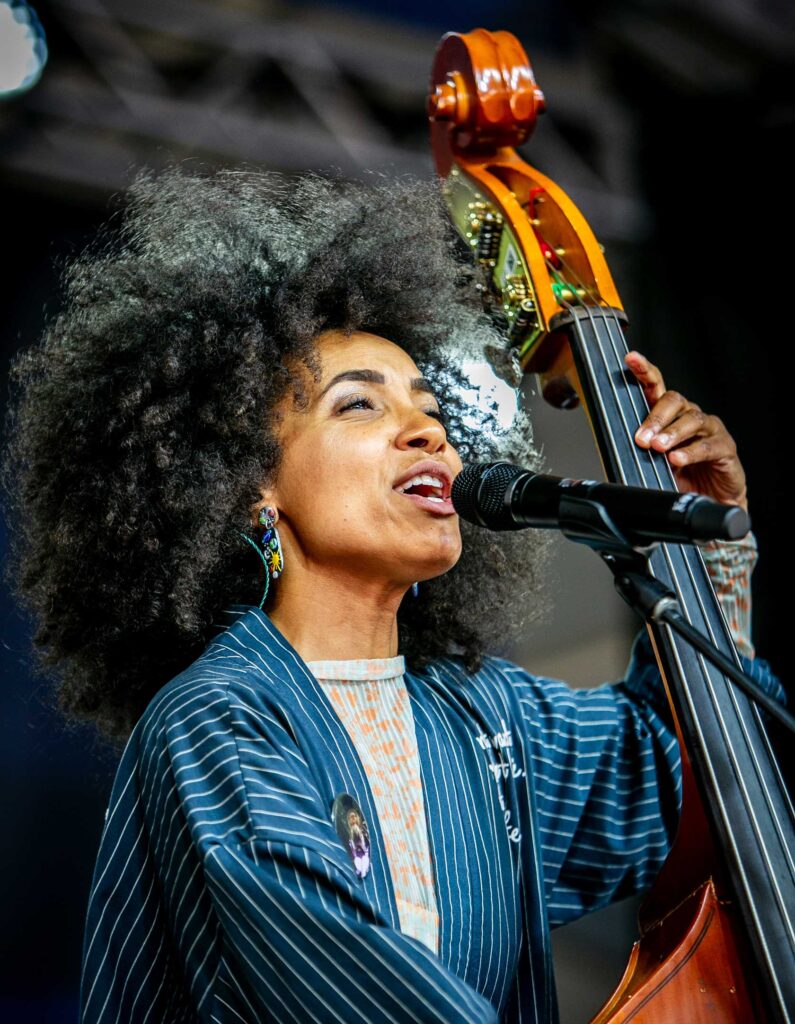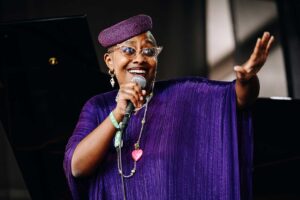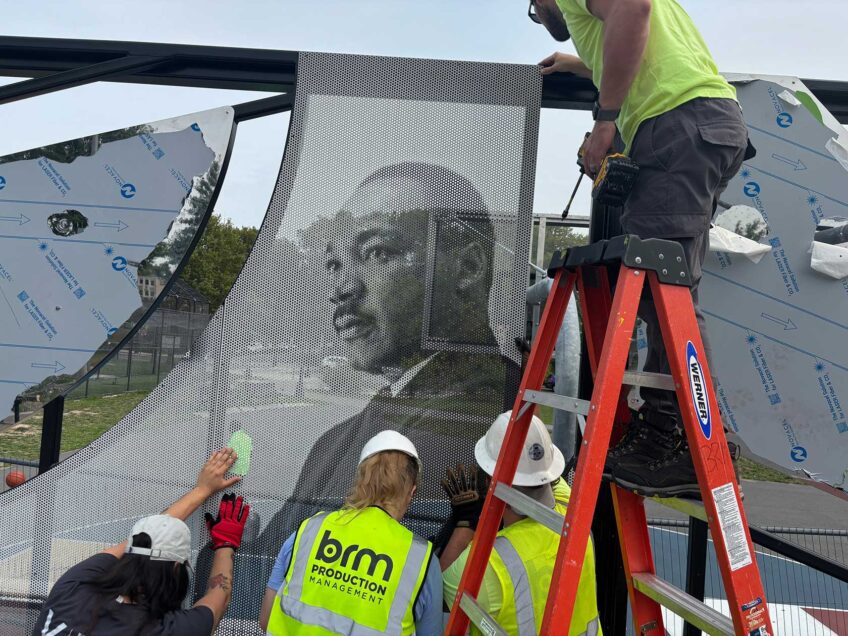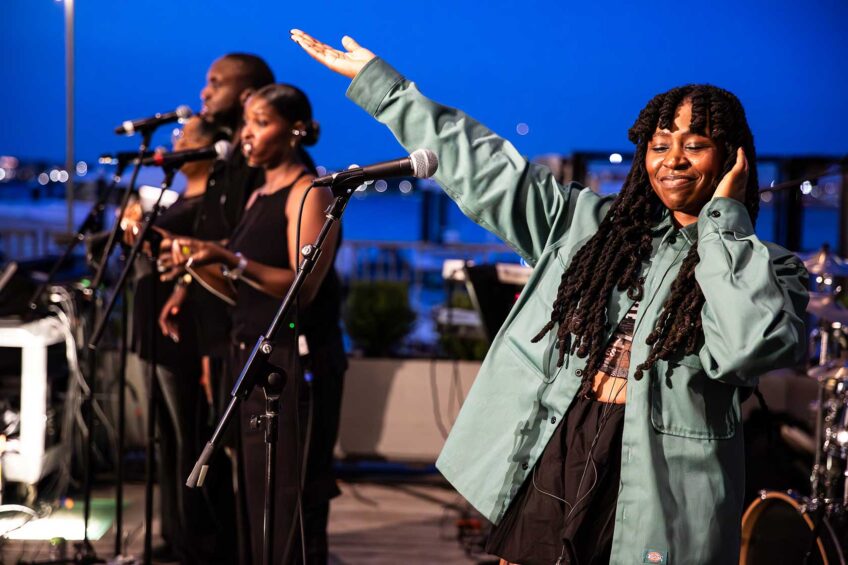Five-time Grammy winner Esperanza Spalding shines at Newport Jazz Festival

Banner Arts & Culture Sponsored by Cruz Companies
For more than seven decades, the annual Newport Jazz Festival has brought generations of jazz musicians and fans together. This year’s festival, the 71st, held at Fort Adams State Park from August 1-3, drew 10,000 people daily to its seaside stages.
Among Sunday’s star performers were Cécile McLorin Salvant and Esperanza Spalding — two vocalists more frequently seen in concert halls or in intimate club settings. Each has a strong following internationally and in Greater Boston. On August 10, Spalding performed with pianist Leonardo Genovese in the Shalin Liu Performance Center in Rockport, presented by Rockport Music. And on November 1, Salvant returns to the Berklee Performance Center, presented by the Celebrity Series of Boston.
Five-time Grammy winner Spalding is also a string instrumentalist and composer whose projects include her therapeutic music incubator “Songwrights Apothecary Lab” and the Prismid Sanctuary, an artist residency she founded and co-directs in Portland, Oregon. Spalding spent a decade in Boston where, with her liquid alto vocals, upright acoustic bass and charisma, she drew capacity audiences to such venues as the Isabella Stewart Gardner Museum. Her many local collaborations included co-creating a jazz opera with Wayne Shorter, “Iphigenia,” which had its world premiere in November 2021 at the Emerson Cutler Majestic Theatre, presented by ArtsEmerson. A professor of practice in Harvard’s Music Department from 2017 until 2022, Spalding previously taught at Berklee College of Music after graduating in three years with a bachelor of music degree.

Cécile McLorin Salvant gave a standout performance at this year’s Newport Jazz Festival. PHOTO: V. NINA WESTERVELT
Salvant, the winner of three Grammy awards for Best Jazz Vocal Album, is also a composer and the recipient of a 2020 MacArthur Fellowship and Doris Duke Artist Award. Salvant began studying classical music at age five. While earning her bachelor’s degree in French law from the Université Pierre-Mendes France in Grenoble, she also studied Baroque music and jazz at the Darius Milhaud Music Conservatory in Aix-en-Provence.
Salvant performed first, accompanied by longtime collaborators Sullivan Fortner on piano and keyboard, bassist Yasushi Nakamura and drummer Kyle Poole.
Regal and elegant in attire as well as in bearing, Salvant wore a purple pillbox hat and silk shawl and radiated warmth, humor and spontaneity. After mining emotional depth in the 20th century Broadway show tunes “Don’t Rain on my Parade” and “With Every Breath I Take,” Salvant performed “Changeable Daddy of Mine,” evoking a landmark 1924 recording by Margaret Johnson and Clarence Williams Blue Five, with strong solos by pianist Fortner and percussionist Poole.
Salvant delivered her tribute to novelist Toni Morrison, “What Does Blue Mean to You?” like a psalm, her muscular voice turning its lyrics into a song of praise, peppered with staccato jabs by Nakamura on bass and Poole on drums and concluding with a dissonant finale and a long wail.
A sweet, rarely performed song by Connie Converse from the mid-1970s, “Talkin’ Like You (Two Tall Mountains)” was sung with tenderness by Salvant to delicate keyboarding by Fortner that evoked a carnival carousel.
With her powerful voice, Salvant transformed familiar songs. Her solemn acoustic treatment of the traditional ballad “John Henry” turned the song into a hymn and battle cry. Her version of “Alfie” was a prayerful call to love.
Following Salvant was Spalding and three musicians she often performs with: Matthew Stevens on guitar and bass; Morgan Guerin on saxophone, keyboards and bass guitar; and drummer Eric Doob. Joining the musicians were dancers Tashae Udo and Kaylin Horgan. All occasionally took part in the vocals with Spalding, who played upright bass, bass guitar, piano and guitar as she sang a set of her own compositions.
Stitched on the back of Spalding’s kimono were the words “Happy life, Perfect life” and her songs were alternately funny, poignant and powerful as they explored truths of the heart.
Spalding opened with “I Want It Now,” introducing it as a song about a greedy child. Playful piano notes evolved into intensive percussion and screaming vocals while the dancers whirled in response. Spalding introduced “12 Little Spells” as a song for those “who use their phone more than they pray.” An extremely versatile performer, she began with a rapid-fire spoken word passage and then as she sang, the musicians joined in as well as the dancers, who concluded knotted in a sculpted pose. During another song, Spalding joined the dancers while singing in a hand-held mike.
Injecting an R&B groove, Spalding and her ensemble delivered “Thang (Hips)” her ode to one’s own “gait and way of walking” and the “stride grease” that loosens one’s “natural pace.” At the piano, Spalding sang her tender love song to an older brother, the percussive “Formwela 5.”
Spalding concluded with “Black Gold,” a song of praise for Blackness and Africa, for which she has crafted an irresistible video addressed to a child. Its refrain says, “Now maybe no one else has ever told you so/ But you’re golden, baby/ Black gold with a diamond soul.”








Leave a Reply
You must be logged in to post a comment.